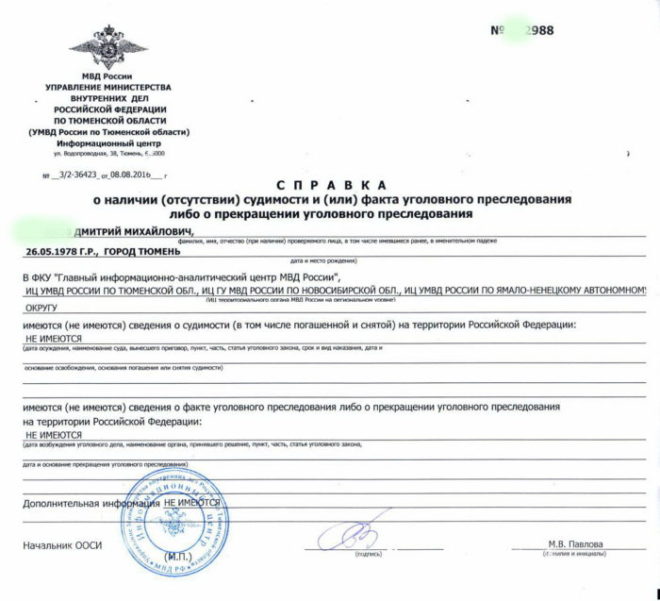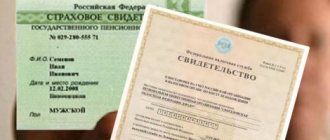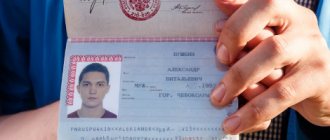Legislative norms
The concept of a criminal record is defined by the Criminal Code of the Russian Federation.
A convicted person is a person who has been punished for committing a crime and has acquired such status from the date of entry into force of a court conviction until the moment when the criminal record is withdrawn or expunged in the manner prescribed by law.
The legal status of an individual, which reflects a criminal record, implies a number of restrictions or imposes additional obligations. Among them is a ban on leaving the country. This limitation is determined by Art. 15 of the Federal Law of August 15, 1996 N 114-FZ “On the procedure for leaving the Russian Federation and entering the Russian Federation.” It lists the reasons why a citizen may be prohibited from leaving the country. These include:
- detention until a decision is made in a case or a court verdict on suspicion of committing a crime enters into legal force;
- being in military service or performing alternative civilian service;
- having access to information of special importance or classified information constituting a state secret;
- evasion of obligations that must be fulfilled by a court decision;
- conviction for a crime and some others.
Also, Federal Law No. 64-FZ dated April 6, 2011 “On administrative supervision of persons released from prison” provides in a number of cases for the court to establish administrative supervision in relation to persons who have an unexpunged or outstanding criminal record. The provisions of this law determine that such supervision can be established even in cases where the sentence has been served. This means that a citizen is obliged to visit the supervisory authority at the frequency assigned to him - once a week or a month. In the presence of such circumstances, leaving the country is complicated by the need to comply with the imposed administrative restrictions.
The ban on crossing the border of the Russian Federation is a temporary measure that will lose its relevance when the criminal record is expunged or removed.
Therefore, the question of whether it is possible to travel abroad after a criminal record has a positive answer. Let's take a closer look.
certificate of good conduct
For a long-term visa, a certificate of no criminal record may be required. Its registration is carried out at the MFC or the Ministry of Internal Affairs of the Russian Federation. The paper can be ordered online. To do this, you need to use the State Services portal. To simplify the procedure, you can turn to intermediary companies for help. However, in this situation it is necessary to issue a power of attorney. The fastest way to get help is online.
Note! If a person independently applies to the authorized body, the documents will be provided free of charge. Payment is required if a person uses the services of intermediaries or draws up paper urgently. In Moscow, the document is ready to be prepared in 1 working day. However, you will have to pay over 18,000 rubles for this.
The certificate is issued using your passport. The citizen will have to write a statement. The standard period for issuing a certificate is 30 days. This does not mean that the registration procedure will necessarily drag on for a month. However, you need to be prepared for this. The help displays the following information:
- Document Number;
- presence of a criminal record of a particular person;
- information about the sentence passed and the court that passed it, if there is a criminal record;
- information about the criminal prosecution against the applicant, if it has been or is ongoing at the time the document was issued;
- signature of an authorized person.
Information about the expungement of a criminal record is not provided in the document. The procedure is performed automatically. If repayment does not occur, the document reflects the article under which the citizen was judged. It is not recommended to apply for a visa in this case. A positive answer is possible if the article is not too serious.
For what period is the ban established?
Since the ban on traveling abroad is directly related to the expungement of a criminal record or its removal, a person who has served a court-imposed sentence should first of all inquire when the restriction will be lifted. After all, only after the deadlines established by law have passed will a citizen be able to freely receive a foreign passport and fly abroad with a criminal record, which from that moment will no longer be an obstacle to crossing the border.
Article 86 of the Criminal Code of the Russian Federation defines the time limits when a criminal record is considered expunged. It all depends on the level of responsibility. So, the restriction on the right to leave can be lifted:
- in the case of a suspended sentence - at the end of the probationary period;
- for punishment without imprisonment - after 1 year;
- in case of imprisonment for a crime of minor or moderate gravity - after 3 years after serving the sentence;
- in case of imprisonment for serious crimes - after 8 years;
- after imprisonment for especially serious crimes - after 10 years.
So, for example, only after the end of the probationary period with a suspended sentence, the answer to the question whether a conditionally convicted person can go to sea will be positive.
Which groups of people are prohibited from leaving the country in 2021
The procedure for obtaining a foreign passport to travel abroad with an expunged criminal record is practically the same. In any case, you will need a standard package of documents, which includes the following papers:
- Civil passport is a copy of all informative pages of the document (identity and registration information).
- Old passport, if available.
- Photographs. To obtain a new passport, you need 2 photographs of 3.5 by 4.5 cm format. The photos must be taken on matte paper in an oval. The color of the photo does not matter.
- Men provide a military ID.
- A copy of the work record book with marks for the last 10 years. Pensioners will need to provide the original.
- Two copies of the application form, completed on double-sided paper.
This is the main list. Another mandatory item is a certificate from the Ministry of Internal Affairs confirming the absence or presence of a criminal record. Such a certificate must be obtained at your place of residence. This document will indicate the absence of a criminal record or its removal/repayment. A story about how to travel abroad with an outstanding debt.

If a citizen with an expunged criminal record has no problems obtaining a foreign passport, then the issue of obtaining a visa is different. The new visa application form includes a clause in which it is necessary to indicate all the criminal records that the applicant had, even those that were successfully expunged 30 years ago. Previously, this item was missing and made leaving much easier.
The fact is that highly developed countries do not particularly want to allow former convicts onto their territory. At the same time, attention is drawn to any offense that has been committed.
However, there is no need to despair. It is still possible to obtain a visa. To do this, it is important not to hide the presence of a criminal record, since they will still be exposed during the data processing process.
When submitting an application and other papers, it is important to prove to the commission that the applicant is a fully reformed citizen of his country. As guarantees, you must provide bank statements that demonstrate financial independence. You can also take a letter of recommendation from your place of work, which will indicate the positive personal characteristics of the applicant for a visa.
Or you can choose to travel to different countries where you do not need to apply for a visa or obtaining one is purely formal at the airport.
The procedure for obtaining permission to enter some foreign countries for a citizen of the Russian Federation who has problems with the law has become somewhat stricter. Application forms of the new format, which are required to be filled out, have a paragraph in which it is necessary to indicate all the applicant’s criminal records, including those expunged many years ago. This measure was initiated by foreign countries with developed economies, as their authorities feared the deterioration of the criminal situation within the country. In this case, the degree of social danger of the committed act is not important.
Obtaining a Schengen visa with a criminal record may be in question even if the applicant was convicted of petty hooliganism, for which he atoned for 10-15 years ago. Attempts to conceal a criminal history will not be successful, since in the process of data processing, as a rule, they are easily identified and confirmed.
But the question of whether it is possible to obtain Schengen with a criminal record, in some cases has a positive solution. If the applicant can prove that after leaving prison he strictly adheres to a law-abiding lifestyle and provides himself with a solid financial foundation, then the chances of moving to Germany or the Netherlands will be quite high.
READ MORE: Insurance of expenses of citizens traveling outside their permanent place of residence
The list depends on the purpose of the visit to a foreign country. The standard set of documents for obtaining a visa includes:
- a questionnaire of the established form;
- certificate from the place of work (salary amount, length of service);
- 2 photos (3.5 x 4.5 cm);
- international passport;
- medical insurance policy;
- income certificate;
- notarized consent of one of the parents (if the child is traveling with his father/mother);
- certificate of payment of the visa fee.
To obtain a long-term permit, additional paperwork may be required:
- invitation from relatives (under the family reunification program);
- health certificate;
- work patent (for employment abroad);
- certificate of no problems with the law;
- rental/purchase agreement;
- a document confirming the fact of payment for tuition at a foreign university.
Answer to the question: “Will they give you a visa if you have a criminal record?” obvious, but the longer the applicant plans to stay abroad, the more extensive the list of certificates and receipts may be, without which it is impossible to cross the border.
The document is issued by representatives of the information and analytical service of the Ministry of Internal Affairs of Russia. Department employees issue a certificate of good conduct for a visa after the citizen writes a corresponding application and attaches a photocopy of his passport to it. The document can also be ordered through the Internet portal “My Documents” (MFC). The period for issuing the certificate is 30 days from the date of application.
The Russian authorities have tightened requirements for debtors. The category of “restricted to travel” includes persons who have not fulfilled monetary obligations to creditors in an amount exceeding 10 thousand rubles. The Bailiff Service actively interacts with the Border Guard Service of the Russian Federation on the issue of identifying non-payers of taxes or other fees, therefore, visa cancellation at the border is a common practice in the fight against violators who are trying to leave the country in order to avoid liability for illegal acts.
The ban may also affect a child if one of the parents is against their son or daughter leaving Russia. And if the question of whether a Schengen visa is granted with a criminal record can have different solutions, then in the absence of a notarized consent of the father/mother to cross the border of the Russian Federation, minors will be denied a visa.
Another category that does not have the right to leave the country is people under investigation. As a rule, they give a written undertaking not to leave, which a priori excludes the possibility of traveling to a foreign country. Suspects of committing a crime in respect of whom a preventive measure in the form of house arrest has been chosen cannot be abroad. Persons on the wanted list are also subject to immediate arrest if they attempt to leave the borders of the Russian Federation.
International passport
How can the ban be lifted?
Nobody likes restrictions, including a ban on leaving the country. However, it will not be possible to bypass the barriers established by law. The Criminal Code of the Russian Federation clearly states that only with the removal or expungement of a criminal record, all legal consequences associated with it are canceled.
Removal and expungement of a criminal record: what is the difference
The methods for expunging a criminal record are fundamentally different. Repayment is a largely automatic process that does not require any action from the convicted citizen other than law-abiding behavior. Withdrawal presupposes the presence of a number of certain conditions and the implementation of an established algorithm of actions. For example, it is possible to have a criminal record removed early at the personal request of the convicted person. In addition, only the judge can decide on this issue.
Which country would you rather live in? ⚡ Take the test in 2 minutes
To file a petition, compelling reasons are required, which include:
- termination or closure of criminal proceedings in the case;
- exclusion of the article that became the basis for the conviction from the current version of the Criminal Code;
- the plaintiff's refusal of the charges brought;
- the expiration of the statute of limitations of the sentence, in which the obligations imposed by the court were not fulfilled by the convicted person for objective reasons;
- absence of complaints about the behavior of the convicted person during the term of imprisonment assigned to him by the court.
If a criminal record is not terminated in one of these two ways, traveling abroad with an outstanding criminal record is impossible.
How to prepare documents
After expunging or removing a criminal record in the prescribed manner, you must obtain the appropriate certificate. To do this, the former convict must visit the police station and submit an application to the competent official for the issuance of a certificate of expungement of the criminal record, as well as the termination of criminal prosecution. The application must include all personal information and present an identification document of the applicant.
Within 1 month, the applicant will personally receive a certificate in the prescribed form. After this, you can begin the procedure of collecting documents and obtaining a passport for traveling abroad. The procedure for obtaining a foreign passport for persons with a cleared or expunged criminal record is no different from the procedure established for other citizens. For this purpose, you need to visit the Main Department of Internal Affairs of the Ministry of Internal Affairs of Russia and submit an application electronically on the website “No Departure” or “Government Services”.
The application must be attached to a package of documents, which includes:
- completed application form;
- internal passport and its photocopies;
- an expired international passport (if available);
- document confirming your relationship to military duty (military ID);
- a certificate of no criminal record issued by the police department at the place of actual residence or registration.

Visa application
How to get a Schengen visa if your criminal record has been completely expunged?
Here is a specific action plan:
- Decide on the destination country. The Schengen area includes 26 countries. With permission from any of these states, you can travel throughout the entire Schengen area, but the permit itself must be obtained at the consulate of the country where you will spend the most time. Otherwise, this may be regarded as a violation of the Schengen registration process.
- Find the nearest consulate where you can obtain a Schengen visa. Instead of the consulate, you can contact the visa center.
- Familiarize yourself with the requirements for submitting documents for Schengen. As a rule, such information is always indicated on the website.
- Collect all necessary information. Read more in the article: “Documents for a Schengen visa.”
- Take a photo. You can take a photo directly at the visa center. Moreover, given the need to submit biometric data, the tourist will still have to take a digital photo there.
- Fill out the form. This can be done either at home by downloading it from the Internet, or at the visa center with the support of a specialist. The form must be filled out exclusively in Latin.
- Call the embassy and find out how reception is carried out: by appointment or on a first-come, first-served basis.
- Come to the Schengen embassy with documents and submit them to the official.
Read more in the article: “How to get a Schengen visa yourself.”
Exceptional cases when a convicted person is allowed to travel abroad
Despite the fact that the law provides for restrictive measures for the departure from the country of persons with an unexpunged or outstanding criminal record, this prohibition has exceptions. They relate to circumstances related to serious illness or death of close relatives living in another state.
In this case, you need to submit a corresponding petition, attaching documents that prove the need to travel abroad. Additionally, you will need to provide papers confirming the degree of relationship with a person who became seriously ill or died in another country (birth, marriage, death certificates, etc.).
FAQ
Many questions arise regarding the ban on leaving the country for citizens with an unexpunged or unexpunged criminal record. They relate both to the purposes for which it is intended to cross the border, and, for example, to the desire to find out the list of states to which travel will be possible after expunging a criminal record.
Is it possible to travel abroad on vacation with a suspended sentence?
Changes made to the legislation in December 2009 made it impossible for citizens with suspended sentences to travel abroad. This measure was taken due to the fact that the previously existing possibility for such persons to leave the country did not make it possible to control their behavior and the fulfillment of the obligations imposed on them by law. This jeopardized the correction process and also provided no guarantee that a new, possibly more serious, crime would not be committed.
How to check for a criminal record at the border
The database of the Information Center of the GUVD of the Russian Federation (IC GUVD of the Russian Federation) contains information about all citizens of the Russian Federation who have a criminal record. It is her data that border guards use when checking those leaving the country. Therefore, doubts should not arise whether criminal records are checked at the border.
Which countries can you travel to after expunging your criminal record?
After a criminal record is cleared or expunged, the state automatically removes from the citizen all obligations and restrictions imposed on him in connection with this. However, the question of which countries you can travel to with a criminal record remains relevant. This is because most states have an extremely negative attitude towards migrants who have a criminal record in their biography. In some cases, the absence of a criminal record is a prerequisite for issuing an entry permit. The USA, Australia, Canada and other states of the British Commonwealth, as well as Western European countries, are categorical on this issue. China pays close attention to even minor offenses.
Restrictions and criminal records
A court decision may impose individual restrictions prescribed by law that are related to a specific crime or misdemeanor. But there is also a general list of restrictive consequences that is the same for all convicted persons:
- The right to purchase and store weapons is limited.
- Freedom of movement throughout Russia is limited, including the choice of place of residence.
- Convicted persons are not included in the list of conscripts for military service, but those who have served their sentences can be accepted into the troops, but strictly defined.
- Persons with a criminal record lose the right to nominate themselves for election to government bodies.
- Convicts have a limited range of professions, which may include work in government or special-regime organizations, medical, educational and other institutions.
- Restricted entry abroad. The article you are reading is dedicated to this topic, and then we will fully expand it for you.
If you plan to travel to countries with a visa regime, you should apply for a visa. It is advisable to have an insurance policy that will help save money in case of illness abroad, since treatment in many countries (except for necessary medical care) is paid. You should also have round-trip tickets and a travel voucher (if you are planning a short trip).
That is, the cancellation of restrictions allows former convicts to safely go on vacation or work in any state.
Offenders must remain permanently in their home country until their criminal records are annulled. However, Russian legislation provides for circumstances that will help to travel abroad with a criminal record. But these must be very good reasons. A serious circumstance is the presence of a close, seriously ill relative abroad who needs to be cared for.
The death of a relative is also considered a serious reason. Usually, in the presence of such circumstances, government authorities are loyal to the situation and allow departure. But you need to provide official confirmation of the relationship and that a serious problem really happened to a loved one. At the same time, a request for permission to enter is submitted.
If everything is fine with your relatives, but you really need to go abroad, you can use another work scheme. It involves moving through Belarus. In this country, they cannot find out about the possible criminal record of a Russian due to the lack of a unified register of convicted persons between the Republic of Belarus and the Russian Federation. In addition, you can get to Belarus even without special travel documents.
In 2021, obtaining a visa with a criminal record will be slightly more difficult than in the past. In the new form, it is necessary to indicate all information about the criminal past, even about cases with an expired statute of limitations. There is no point in hiding these unsightly facts of your biography: migration services carefully check information about your criminal record, so if it turns out that a person has a criminal past, not only will they not be given a document, but they may also open a case for providing false information about themselves.
A conditionally convicted person can travel abroad if he provides evidence of his complete correction. To do this, he should provide statements from his bank accounts to confirm his financial well-being. A letter of guarantee from the employer, in which he indicates the positive characteristics of the citizen applying for a visa document, will also be useful. As an alternative, you should choose countries where applying for a visa is a formality or is not required at all.
We suggest you read: Where to call if you didn’t receive a cash receipt








